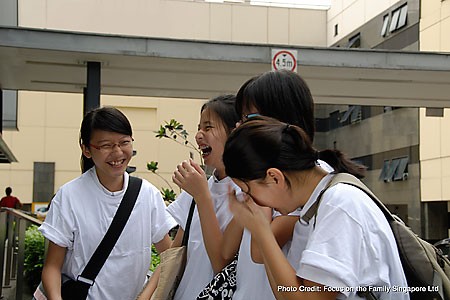Here is the second part of a series of questions and answers on teenagers
Do you find it hard to understand your teenager at home? Here is a question on teenagers in relation to the family, with some answers from Focus on the Family.
Question: Our teenager has been spending all his time with friends, and he’s never available to take part in family activities. What should we do?
Answer: Relax. A good portion of your teen’s behaviour is part of a normal developmental process called “separation and individuation”.
Between the ages of six and 12, a child’s need to identify with his peer group starts to take precedence over his (or her) sense of identification with parents and family. This continues through the teen years and usually concludes with complete separation and independence by age 18 or 21.
To resist this natural pulling away only hinders growth and creates unnecessary tension in the household.
You can make your teen’s transition from childhood to adulthood smoother and more navigable if you keep the following suggestions in mind:
Reassess Your Own Motives
First, as difficult as this sounds, you need to reassess your own motives. Is it possible that you have selfish motives for wanting your child to stay close to you?
Do you have a hidden emotional need that you’re expecting him to fulfil? Are you afraid of letting go and seeing him make mistakes on his own? If so, you need to realise that these are your problems, not his.
Once you’ve settled these questions, you need to find a way to embrace and affirm the shift that’s occurring in your teen’s outlook.
In other words, allow for separation while simultaneously helping him realise that he’s wanted at home too.
Positive & Healthy
Since his peers are so important to him, you should start thinking in terms of encouraging him to develop a positive social life and to form healthy friendships. You can’t actually pick his friends for him, of course, but you can increase his chances of making good choices by shaping his environment. Help him to get involved with a group that gives youth guidance. Urge him to take part in volunteer trips, sports, or other constructive activities.
Host Friends
Another way to exert a measure of positive influence in this area is to host activities for your teen’s friends. For instance, you could organise a weekend barbecue.
This will provide you with a window into your teen’s peer group as well as a discreet and relaxed opportunity to chaperone his interaction with friends. You might also encourage him to invite friends to take part in your family events.
While there’s certainly a place for “family-only” activities, there’s no reason why you can’t have additional outings of a more inclusive nature.
He’ll be less resistant to family outings if you tailor them to be more attractive from his point of view.
Used by permission of Focus on the Family Singapore.
For more parenting resources, visit www.family.org.sg.
© 2010 Focus on the Family. All rights reserved. International copyright secured.
ADVERTISEMENTS









